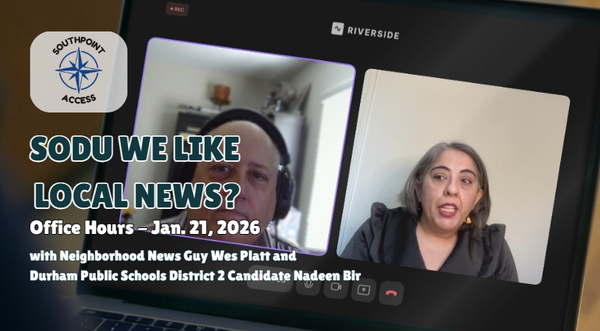[Raising Durham] Teaching Children the Power of Self-Advocacy
![[Raising Durham] Teaching Children the Power of Self-Advocacy](/content/images/size/w1200/wordpress/2024/10/advocate2024.png)

When my daughter Harper goes to her monthly clinic appointments, she commands the situation with a level of grace and authority far beyond her years. She’ll politely tell the nurse or technician that she needs Buzzy (a small vibrating device that helps with needle pain), a video for distraction, and that while numbing spray is nice, it’s not essential. She’ll request a countdown before the needle goes in, and another before it’s removed, followed by light pressure on the puncture point. Harper, in these moments, is in control. She’s her own best advocate.
For many of us, self-advocacy is something we’re still learning as adults, much less something we expect children to master. But Harper has learned this skill early in life, thanks to the guidance of trained professionals, like child life specialists, and the steady support of those who love her. While her lessons in self-advocacy were born out of necessity, her approach offers a universal reminder: advocating for oneself is a powerful and essential tool, no matter your age.
Reflecting on my own childhood, I remember that children were expected to be seen and not heard. “Because I said so” was the anthem of many parents in that era. We were taught to respect authority without question, and any pushback could be perceived as disrespectful. But thankfully, times are changing. Now, we strive to give our children more autonomy than we had, believing that empowering them to voice their needs is not only generous but also necessary.
Yet, encouraging self-advocacy in children can feel tricky. After all, many of us still struggle with it ourselves. In situations where someone holds authority—be it a doctor, a teacher, or even a peer—we may hesitate to speak up, fearing repercussions or the appearance of being difficult. This is particularly true for children, who are often taught to respect adults unquestioningly. So how do we teach them to balance respect with self-advocacy?
The key is in how we approach these conversations. Advocacy doesn’t have to be confrontational. In fact, it works best when it’s rooted in curiosity and mutual understanding. For example, there was a time during Harper’s treatment when I disagreed with a particular medical decision. Instead of being defensive or dismissive—or feeling obligated to just blindly do what the doctor said, I expressed my concerns calmly and clearly, engaging in a mature conversation with her doctor. Because of that approach, we found common ground and tried things my way. The doctor appreciated the respectful dialogue, and I didn’t worry about offending them. This interaction reinforced the idea that advocating for ourselves can be done politely and with mutual respect.
This lesson extends far beyond the walls of a clinic. Whether it’s in school, on a sports team, or in everyday life, children can be taught to advocate for themselves by first understanding their rights, gathering all the facts, and approaching the situation with an open mind. Encouraging them to start with a place of understanding—rather than confrontation—helps take the edge off advocacy. It also prepares them for the challenges of adult life, where self-advocacy will be crucial.
Of course, self-advocacy isn’t just for kids. It’s something we all need to practice, particularly as we navigate complex situations. Take, for example, women of a certain age dealing with the challenges of perimenopause. How often are we told that brain fog, weight gain, and other disruptive symptoms are just part of the process and we should accept them? Yet, advocating for ourselves in these situations can change the narrative and the outcome. We can ask for labs, discuss potential causes, and seek out solutions. A doctor may know more about medicine than we do, but no one knows our bodies better than us.
However, it’s important to acknowledge that advocacy doesn’t come without its challenges. I recognize that as a college-educated, middle-class, white woman, my ability to speak up often comes with fewer risks than others face. I don’t have to worry about facing racism, though I’ve experienced my share of misogyny. My concerns about upsetting someone rarely rise to the level of fearing true retaliation. This privilege makes advocacy easier for me in many situations, and it’s essential to recognize that not everyone has that same experience.
As we teach our children to advocate for themselves, we also need to be mindful of these dynamics. Advocacy looks different depending on who you are and where you come from. But one thing remains constant: the sooner we equip our kids with the skills to speak up for themselves, the more empowered they’ll be in navigating a world that doesn’t always make it easy.
And perhaps, if we’re lucky and open-minded, they’ll teach us a thing or two along the way.
Heather Hindin is a Durham-based educator and single parent to 11-year-old Harper. With a career dedicated to equity in education, Heather brings both professional insight and personal experience to Southpoint Access. As the mother of a pediatric cancer survivor, she understands the importance of community and candor in overcoming parenting challenges. Together, Harper and Heather advocate for pediatric cancer awareness and research. They’ve founded Harper’s Home, a non-profit providing affordable housing to families with children receiving treatment at Duke. Heather’s Raising Durham: Tales from a Bull City Mom column offers a blend of practical advice, compassion, and community engagement, drawn from her journey as an educator, advocate, and most importantly, a mom.





